Class 12 RD Sharma Solutions – Chapter 9 Continuity – Exercise 9.1 | Set 1
Last Updated :
26 May, 2021
Question 1. Test the continuity of the following function at the origin:

Solution:
Given that

Now, let us consider LHL at x = 0




Now, let us consider RHL at x = 0


So, LHL ≠ RHL
Therefore, f(x) is discontinuous at origin and the discontinuity is of 1st kind.
Question 2. A function f(x) is defined as  . Show that f(x) is continuous at x = 3.
. Show that f(x) is continuous at x = 3.
Solution:
Given that

So, here we check the given f(x) is continuous at x = 3,
Now, let us consider LHL at x = 3




Now, let us consider RHL at x = 3




So, f(3) = 5
LHL= RHL = f(3)
Therefore, f(x) is continuous at x = 3
Question 3. A function f(x) is defined as

Show that f(x) is continuous at x = 3.
Solution:
Given that

So, here we check the given f(x) is continuous at x = 3,
Now, let us consider LHL at x = 3




Now, let us consider RHL at x = 3




So, f(3) = 6
LHL= RHL= f(3)
Therefore, f(x) is continuous at x = 3
Question 4. 
Find whether f(x) is continuous at x = 1
Solution:
Given that

So, here we check the given f(x) is continuous at x = 1,
Now, let us consider LHL at x = 1






Now, let us consider RHL at x = 1






So, f(1) = 2
LHL= RHL = f(1)
Therefore, f(x) is continuous at x = 1
Question 5. If 
Find whether f(x) is continuous at x = 0.
Solution:
Given that

So, here we check the given f(x) is continuous at x = 0,
Now, let us consider LHL at x = 0



Now, let us consider RHL at x = 0


So, f(0) = 1
LHL = RHL≠ f(0)
Therefore, f(x) is discontinuous at x = 0.
Question 6. If 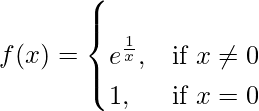
Find whether f is continuous at x = 0.
Solution:
Given that
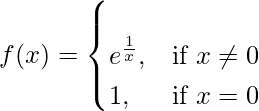
So, here we check the given f(x) is continuous at x = 0,
Now, let us consider LHL at x = 0



Now, let us consider RHL at x = 0


So, LHL≠ RHL
Therefore, the f(x) is discontinuous at x = 0.
Question 7. Let 
Show that f(x) is discontinuous at x = 0.
Solution:
Given that

So, here we check the given f(x) is discontinuous at x = 0,
Now, let us consider LHL at x = 0





= 2 × 1/4 = 1/2
Now, let us consider RHL at x = 0




= 2 × 1/4 = 1/2
f(0) = 1
LHL= RHL ≠ f(0)
Therefore, the f(x) is discontinuous at x = 0.
Question 8. Show that  is discontinuous at x = 0.
is discontinuous at x = 0.
Solution:
Given that

So, here we check the given f(x) is discontinuous at x = 0,
Now, let us consider LHL at x = 0



Now, let us consider RHL at x = 0


f(0) = 2
Thus, LHL= RHL≠ f(0)
Therefore, f(x) is discontinuous at x = 0.
Question 9. Show that  is discontinuous at x = a.
is discontinuous at x = a.
Solution:
Given that

So, here we check the given f(x) is discontinuous at x = a,
Now, let us consider LHL at x = a



Now, let us consider RHL at x = a



Thus, LHS ≠ RHL
Therefore, the f(x) is discontinuous at x = a.
Discuss the continuity of the following functions at the indicated points(s):
Question 10 (i). 
Solution:
Given that

So, here we check the continuity of the given f(x) at x = 0,
Let us consider LHL,



Now, let us consider RHL,


f(0) = 0
Thus, LHL= RHL= f(0) = 0
Therefore, f(x) is continuous at x = 0.
Question 10 (ii).  at x = 0
at x = 0
Solution:
Given that

So, here we check the continuity of the given f(x) at x = 0,
Let us consider LHL,


Now, let us consider RHL,


f(0) = 0
Thus, LHL= RHL = f(0) = 0
Therefore, f(x) is continuous at x = 0.
Question 10 (iii).  at x = a
at x = a
Solution:
Given that

So, here we check the continuity of the given f(x) at x = a,
Let us consider LHL,



Now, let us consider RHL,



f(a) = 0
Thus, LHL= RHL= f(a) = 0
Therefore, f(x) is continuous at x = 0.
Question 10 (iv).  at x = 0
at x = 0
Solution:
Given that

So, here we check the continuity of the given f(x) at x = 0,




= 1/2 × 1/1 = 1/2
And,
f(0) = 7
 ≠ f(0)
≠ f(0)
Therefore, f(x) is discontinuous at x = 0.
Question 10 (v).  n ∈ N at x = 1
n ∈ N at x = 1
Solution:
Given that

So, here we check the continuity of the given f(x) at x = 1,
Let us consider LHL,


![Rendered by QuickLaTeX.com =\lim_{h\to0}\frac{1-[1-nh+\frac{n(n-1)}{2!}h^2+...]}{h}](https://www.geeksforgeeks.org/wp-content/ql-cache/quicklatex.com-46fa9330f52fafb5790b3f960f4a4f6f_l3.png)

Now, let us consider RHL,


![Rendered by QuickLaTeX.com =\lim_{h\to0}\frac{1-[1+nh+\frac{n(n-1)}{2!}h^2+...]}{-h}](https://www.geeksforgeeks.org/wp-content/ql-cache/quicklatex.com-07295640fe538c41c4f27ff93b294ae2_l3.png)

f(1) = n – 1
Thus, LHL = RHL ≠ f(1)
Therefore, f(x) is discontinuous at x = 1.
Question 10 (vi).  at x = 1
at x = 1
Solution:
Given that

So, here we check the continuity of the given f(x) at x = 1,
Let us consider LHL,




Now, let us consider RHL,



f(1) = 2
LHL= RHL = f(1) = 2
Therefore, f(x) is discontinuous at x = 1.
Question 10 (vii).  at x = 0
at x = 0
Solution:
Given that

So, here we check the continuity of the given f(x) at x = 0,
Let us consider LHL,



Let us consider RHL,


Thus, LHL ≠ RHL
Therefore, f(x) is discontinuous at x = 0.
Question 10 (viii).  at x = a
at x = a
Solution:
Given that,

f(x) = (x – a)sin{1/(x – a)}, x > 0
= (x – a)sin{1/(x – a)}, x < 0
= 0, x = a
Let us consider LHL,

Now, let us consider RHL,

⇒ 
Therefore, f(x) is continuous at x = a.
Question 11. Show that  is discontinuous at x = 1.
is discontinuous at x = 1.
Solution:
Given that,

So, here we check the given f(x) is discontinuous at x = 1,
Let us consider LHL,



Now, let us consider RHL,


LHL ≠ RHL
Therefore, f(x) is discontinuous at x = 1.
Question 12. Show that 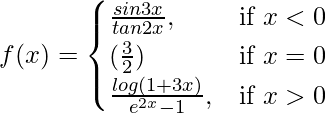 is continuous at x = 0
is continuous at x = 0
Solution:
Given that,
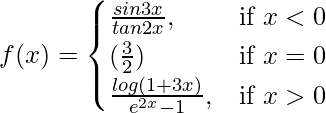
So, here we check the given f(x) is continuous at x = 0,
Let us consider LHL,




Let us consider RHL,



f(0) = 3/2
Thus, LHL = RHL = f(0) = 3/2
Therefore, f(x) is continuous at x = 0.
Question 13. Find the value of ‘a’ for which the function f defined by
 is continuous at x = 0.
is continuous at x = 0.
Solution:
Given that,

Let us consider LHL,




Now, let us consider RHL,

⇒ 





= (1/2) × 1 × 1
⇒ 
If f(x) is continuous at x = 0, then

⇒ a = 1/2
Question 14. Examine the continuity of the function
 at x = 0
at x = 0
Also sketch the graph of this function.
Solution:
Given that,

So, here we check the continuity of the given f(x) at x = 0,
Let us consider LHL,



Now, let us consider RHL,


LhL ≠ RHL
So, the f(x) is discontinuous.

Question 15. Discuss the continuity of the function
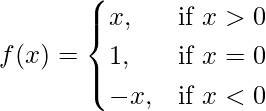 at the point x = 0.
at the point x = 0.
Solution:
Given that,
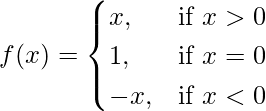
So, here we check the continuity of the given f(x) at x = 0,
Let us consider LHL,


Now, let us consider RHL,


f(0) = 1
LHL = RHL ≠ f(0)
Hence, the f(x) is discontinuous at x = 0.
Like Article
Suggest improvement
Share your thoughts in the comments
Please Login to comment...